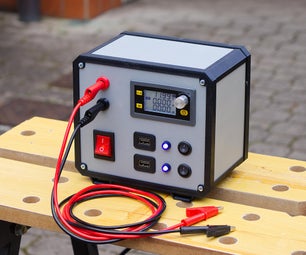Introduction: XXL Switchbox With Extra Storage
I planned to do a thing like this quiet a long time, but there was no actual need for it. This changed a few weeks ago. I need to move to another (very small) place for half a year and I wanted to take my computer stuff at least partly with me. So I wanted to make a all-in-one office-storage-LAN-switch-box :-).
I decided that it had to hold at least:
-my main paperwork
-two of my external harddrives (the largest ones of course)
-my old, but small Canon BJC 85 printer
-a WLAN-router and/or a network switchbox
-a Belkin 5-port USB to network hub
-enough room for other accessories...
-and of course as many switchable power plugs as possible
As I had this black wooden box stuffed with lots of things wich could also be stored somewhere else I decided to take it for this build/hack.
The box comes like other stuff I use for hacking/making from the swiss army supply shop. During my service times I really hated those boxes. They were called "Off-Kiste" wich means box for officers and our officers used them to store all their paperwork, so these black beauties were usually very heavy and guess who had to schlepp them around...
But on the good side, the boxes are very sturdy and lockable!
You may get one in switzerland at the local army shops. Check out the locations of the shops at www.armyliqshop.ch
Step 1: Materials and Tools
materials:
5 wall mounted female powerplugs
1 build in plug male for the external powersupply
1 big lighted powerswitch
5 small lighted powerswitches
various leftovers of black cutable plastic
2m aluminium L-profile
1m M6 bolt
4 M6 screw-in nuts
4 M6 winged nuts with washers
2 short M12 bolts with nuts and washers
4 strips of steel with suiting holes (2 small/2 large)
a hole lot of rivets and various screws
wire
tools:
cutting knive
riveting tool
drill
files
soldering device
Step 2: Taking Measures / Cutting the Pieces
I decided to put the switches and plugs to the small right side of the box.
I cutted all the pieces for the switchbox part and placed the switches and the plugs. After having the holes ready I riveted the plugs in place.
After that I knew on witch hight I could place the power-input and the main switch on the case and I marked the shape of the holes, drilled several holes alongside the edge first until the middlepart fell out and put them into the right shape with the file.
Step 3: Placing the Harddiscs
first I had to measure the outside bottom of the box to know were the inforcements (and the nails) are to get the thickest part of the bottom to drill the holes in. Then I measured the width of the HD cases and added some extra space to the sides to fit the metall strips I bought from the hardwarestore. I marked and drilled the 4 holes and put some "screw-in nuts" in.
Step 4: Soldering
Next I soldered all the wires in place and put together the external parts of the switchbox with the L-profile an the rivets. The switchbox was mounted in the case with the L-profiles, and oh wonder it worked :-)
Step 5: Compartments
I mounted the compartment dividers according to the needed space. The one next to the switches has a cutout in the lower front corner to lead the cables through. Then I put the hardiscs in with some slices of foam inbetween to reduce vibrations and to provide some airflow. After that I test-wired it alltogether with my Belkin USB hub. (The idea is to add a WLAN-router as a repeater to integrate the whole thing into a existing network)
Step 6: Cover
To add a bit more protection and optical clearness I placed a grid on top of the discs. It is just laid over the 4 bolts that hold down the HD's. Probably I will do the same over the cable clutter next to the switches later.
Step 7: Top Compartment / Finished Project
All this cases come with a top compartment, wich fits in neatly. To be able to put it on top of the box instead of into it (to provide airflow) I placed metal sprips in the two front corners wich can swing out so that it sits on top of the edge of the case.
In the top compartment iI will place a small printer and later the router.
Perhaps I will add a ventilation fan to the HD-compartment in a later step, but for now I can work with it as it is.













